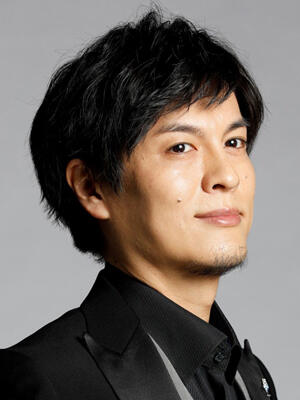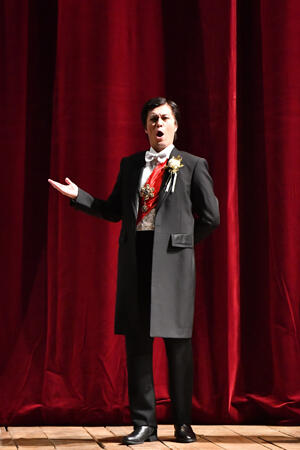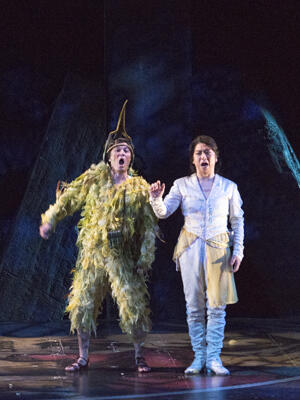Interview: KONDO Kei on "Die Zauberflöte"
 ―In October 2020, you sang the role of Demetrius in Britten's A Midsummer Night's Dream, which was the first opera to be staged at the New National Theatre, Tokyo after its closure due to the pandemic.
―In October 2020, you sang the role of Demetrius in Britten's A Midsummer Night's Dream, which was the first opera to be staged at the New National Theatre, Tokyo after its closure due to the pandemic.
A Midsummer Night's Dream was the first stage for me too after a long break since February 2020. Originally I was the cover cast for Demetrius, but because the singers weren't allowed to come from abroad, I got the call to sing the role on stage. It was the first time as a professional singer that I hadn't sung in front of an audience for so long, and to make my return on the NNTT stage was quite terrifying. Even though I had been practicing at home, if you don't sing in a large space such as a hall, it's difficult to get the feeling back. At the beginning it was challenging, but I gradually got used to it again and made it in time for the opening.
―A Midsummer Night's Dream was a wonderful production, and for us as the audience, it was an emotional experience to be back in the opera house again. How did you feel after the opening performance?
At the NNTT, there are usually four or five performances in each production, so even when the opening performance is over, I tend to think more about what I can improve in the next performance. Still, I remember feeling happy that I could finally return to the stage, especially in such a beautiful and fantasy-filled staging as A Midsummer Night's Dream.
A Midsummer Night's Dream (2020)
―When was your first encounter with opera? I read in an article that your mother was a ballet teacher and your sister is a ballet dancer. Did you also learn ballet as a child?
I enjoy watching ballet, but I never learnt ballet myself because I didn't want to wear white tights! I remember absolutely refusing when I was about four or five years old. But as a child, I loved the music of Tchaikovsky's Nutcracker. I grew up in Nagano, and every year my parents took us to see the Nutcracker ballet in Tokyo. I think that was when I got interested in music. Actually, I was more interested in conducting than ballet. I then started to study the piano so that I could become a conductor.
―How did you get into singing?
As I studied the piano, I was attracted to the music of Chopin and others, and because I wanted to be a conductor I listened to a lot of symphonies. In my third year at high school, I told my music teacher I wanted to study music seriously. The teacher suggested I study singing first, because I have a good voice. So I did, but initially I specialized in Lieder, not opera. My interest in opera emerged a few years later, and it was when I sang the title role in Don Giovanni in the Graduate School opera production that I became serious about opera. The rehearsals were hard going, but in the actual performance I thought, "wow, this is really fun!" I experienced this sensation of watching myself on stage from high above. When Don Giovanni goes to hell at the end, I even thought I wouldn't mind dying now. That was the moment I decided to pursue an operatic career.
―Subsequently you studied at the NNTT Opera Studio. What did you learn during your time there?
The Opera Studio was where I learnt everything about opera; I was taught all the basics. The reason I decided to audition for the Opera Studio was because when I was still a student, I went to see a workshop performance there with a friend. It was a staging by the British director, David Edwards, and he had cleverly combined excerpts from various operas into a coherent whole using just a simple set. Until then, I had felt a little uncomfortable about Japanese people performing opera, but when I saw this staging, I thought, "this is it!" Opera is a Western culture, but the human emotions portrayed in opera are universal, and I realized that as long as I can express those emotions, the type of production doesn't matter, and even as a Japanese, I can portray the characters.
At the Opera Studio, I trained with many directors, and learnt a lot about the various types of acting. The reason I am able to adapt to various interpretations of the directors now is because I was able to learn the basics of acting at the Opera Studio. Once you are clear about the acting, i.e. about the emotions of the character, then you can delve deeper into the music too.
―Your voice is a deep and resonant baritone. How has your voice developed?
As a student, and also in my days at the Opera Studio, I had a bright voice and people would often tell me I'm more of a tenor. Over the years, maybe my voice has deepened, although I haven't changed the way I produce my voice. My teachers at college and the Opera Studio always told me that I shouldn't try to produce a heavier voice and that I should sing naturally with my own voice. Because baritone roles tend to be older characters, singers often try to adapt their voice to the role. Fortunately I was taught to sing according to my age, and I guess what used to sound like a tenor voice has now developed into a baritone voice.
―You will appear as Papageno in NNTT's Die Zauberflöte in April. When did you first sing Papageno?
In fact, my NNTT debut was jumping in as Papageno at short notice, back in January 2016. In October the previous year, I had returned from my studies in Germany, and I was the cover cast for Papageno.
―You have recently sung Papageno in the Kentridge production at ROHM Theatre Kyoto (educational programme), and also in the Nikikai production as well. It's one of your signature roles, isn't it?
Actually, for a long time, people used to say I'm not suited to Papageno. Especially in my student days, they thought I would be better suited to the "handsome roles" (laughs). But personally, I think I am closer to Papageno than Don Giovanni for example.
―In what sort of way?
As a child, I was always romping around and loved being the centre of attention. After school, I would go straight to the hills close by to play instead of going home, and would worry my parents. I have become calmer as an adult, but I'm still a Papageno at heart. So when I sing this role, I can be myself and I enjoy playing him.
―What do you find most attractive about Papageno? His outlook on life is very different from Tamino's isn't it?
Papageno is a very easy-going guy and as long as he can eat and drink and be merry, he's happy. Yet, of all the characters in this opera, I think he is the most sensitive and caring. He is kind and considerate about others. For example, when Pamina is in despair because Tamino won't talk to her during his ordeal, Papageno tries to cheer her up.
―It's actually a plum role, don't you think?
Yes, that's true, partly because the librettist Schikaneder himself played Papageno at the first performance. Probably Papageno was the person he wanted to be. Both Schikaneder and Mozart were highly intellectual people and they were deeply aware of the darker aspects of people, as well as the political situation of the time. Maybe that is why they created a character like Papageno, who could be free from such things.
Suzuki-san was the Tamino in the 2016 production at NNTT when I jumped in as Papageno. He was very kind and helpful, showing me discreetly where to stand on stage whenever I was at a loss. Subsequently we have appeared together as Tamino and Papageno in other theatres, and in 2020 we performed in this current production in the Kansai tour for high school students. He is like a reliable big brother and it's very reassuring to perform with him. I've performed with Miyake-san a few times, but not in Die Zauberflöte. I've only sung the Papageno-Papagena duet with her in concert. She has a very beautiful voice and is a flexible actor too. Sunakawa-san is my idol, so I'll probably be a bit nervous to sing with her. Admittedly I'm in an enviable position of being able to sing with two such lovely singers.

Die Zauberflöte (2016)
―You are a member of the "Handsome Brothers" - a vocal group of four baritones - together with MIYAMOTO Masumitsu, YONASHIRO Kei, and KAKU Toru. What is your role within the group?
To be honest, our group name is a bit embarrassing (laughs). I'd say I'm the comic of the group, whereas the others are all handsome and cool. People tell me I move in an awkward way, and apparently it's funny to see how I react when someone suddenly talks to me or when I'm confused. In that sense too, I'm like Papageno.
―What aspects of Papageno would you like the audience to look out for?
I hope they will look out for his easy-going personality, as well as the kind and caring aspects of his character.
―I'm looking forward to the performance. Thank you very much.
(Interview by INOUCHI Mika)
Opera "Die Zauberflöte"
On Stage from 16 to 24 April.
See here for more information.

